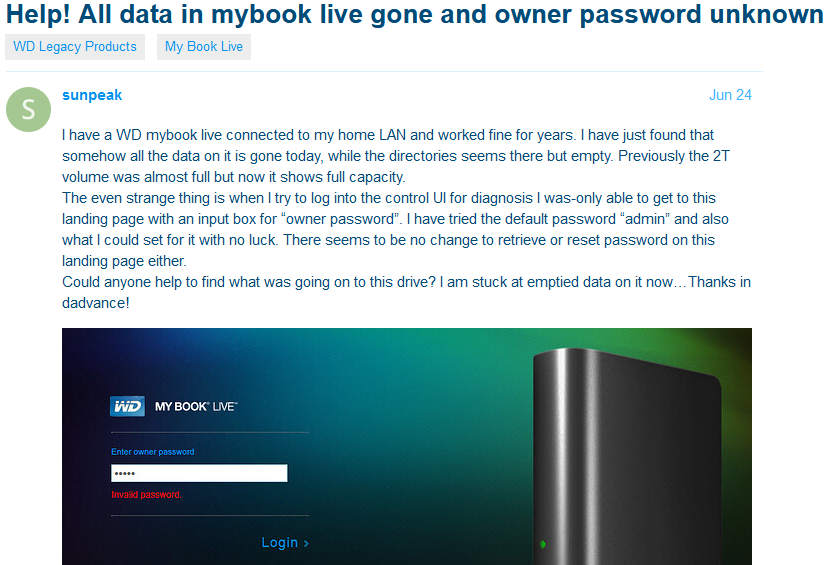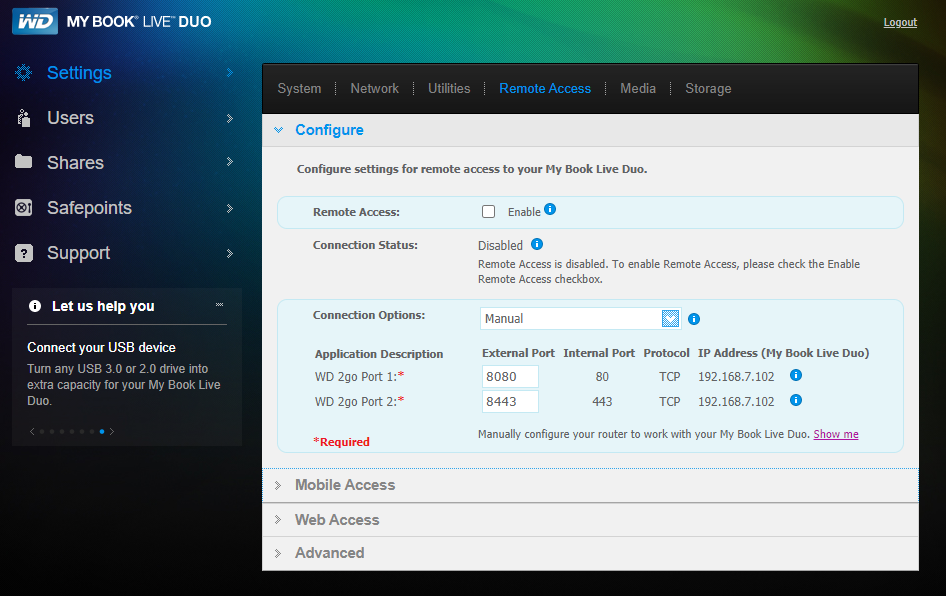MyBook Users Urged to Unplug Devices from Internet
Krebs on Security 2021-06-26
Hard drive giant Western Digital is urging users of its MyBook Live brand of network storage drives to disconnect them from the Internet, warning that malicious hackers are remotely wiping the drives using a critical flaw that can be triggered by anyone who knows the Internet address of an affected device.

One of many similar complaints on Western Digital’s user forum.
Earlier this week, Bleeping Computer and Ars Technica pointed to a heated discussion thread on Western Digital’s user forum where many customers complained of finding their MyBook Live and MyBook Live Duo devices completely wiped of their data.
“Western Digital has determined that some My Book Live and My Book Live Duo devices are being compromised through exploitation of a remote command execution vulnerability,” the company said in a statement June 24. “In some cases, this compromise has led to a factory reset that appears to erase all data on the device. The My Book Live and My Book Live Duo devices received its final firmware update in 2015. We understand that our customers’ data is very important. We are actively investigating the issue and will provide an updated advisory when we have more information.”
Western Digital’s brief advisory includes a link to an entry in the National Vulnerability Database for CVE-2018-18472. The NVD writeup says Western Digital WD My Book Live and WD My Book Live Duo (all versions) have a root Remote Command Execution bug.
“It can be triggered by anyone who knows the IP address of the affected device, as exploited in the wild in June 2021 for factory reset commands,” NVD wrote.
Examine the CVE attached to this flaw and you’ll notice it was issued in 2018. The NVD’s advisory credits VPN reviewer Wizcase.com with reporting the bug to Western Digital three years ago, back in June 2018.
In some ways, it’s remarkable that it took this long for vulnerable MyBook devices to be attacked: The 2018 Wizcase writeup on the flaw includes proof-of-concept code that lets anyone run commands on the devices as the all-powerful “root” user.
Western Digital’s response at the time was that the affected devices were no longer supported and that customers should avoid connecting them to the Internet. That response also suggested this bug has been present in its devices for at least a decade.
“The vulnerability report CVE-2018-18472 affects My Book Live devices originally introduced to the market between 2010 and 2012,” reads a reply from Western Digital that Wizcase posted to its blog. “These products have been discontinued since 2014 and are no longer covered under our device software support lifecycle. We encourage users who wish to continue operating these legacy products to configure their firewall to prevent remote access to these devices, and to take measures to ensure that only trusted devices on the local network have access to the device.”

A local administration page for the MyBook Live Duo.
Wizcase said the flaw it found in MyBook devices also may be present in certain models of WD MyCloud network attached storage (NAS) devices, although Western Digital’s advisory makes no mention of its MyCloud line being affected.
The vulnerable MyBook devices are popular among home users and small businesses because they’re relatively feature-rich and inexpensive, and can be upgraded with additional storage quite easily. But these products also make it simple for users to access their files remotely over the Internet using a mobile app.
I’m guessing it is primarily users who’ve configured their MyBooks to be remotely accessible who are experiencing these unfortunate drive wipes. Regardless, it’s probably safest to observe Western Digital’s advice and disconnect any MyBooks you have from ethernet access.
If you’d still like to keep your MyBook connected to your local network (at least until you can find a suitable backup for your backups), please make double sure remote access is not enabled in your device settings (see screenshot above).